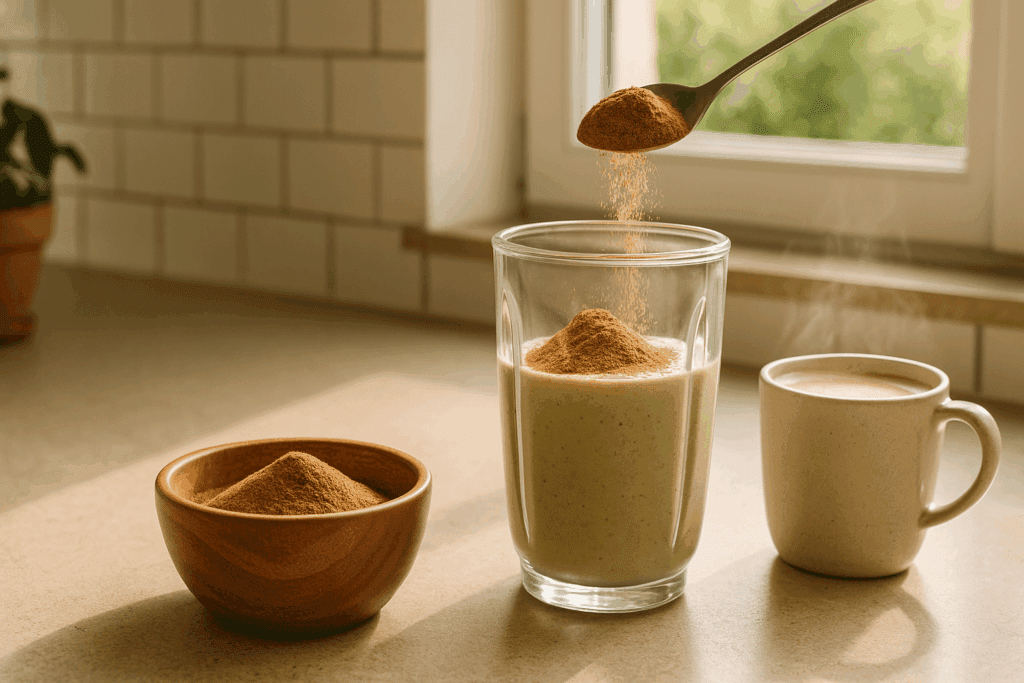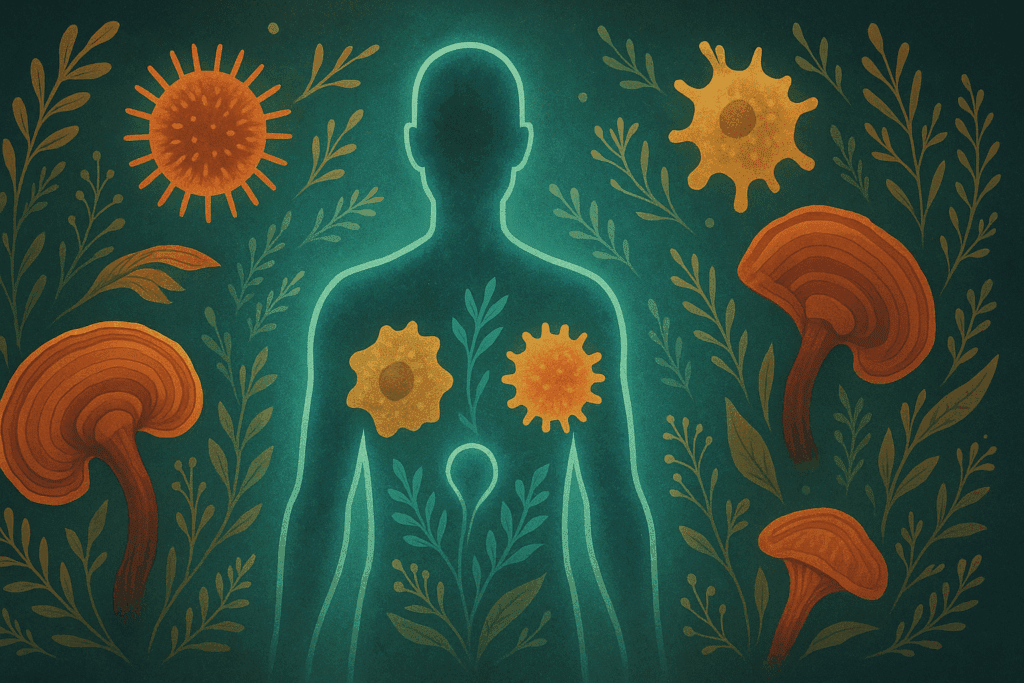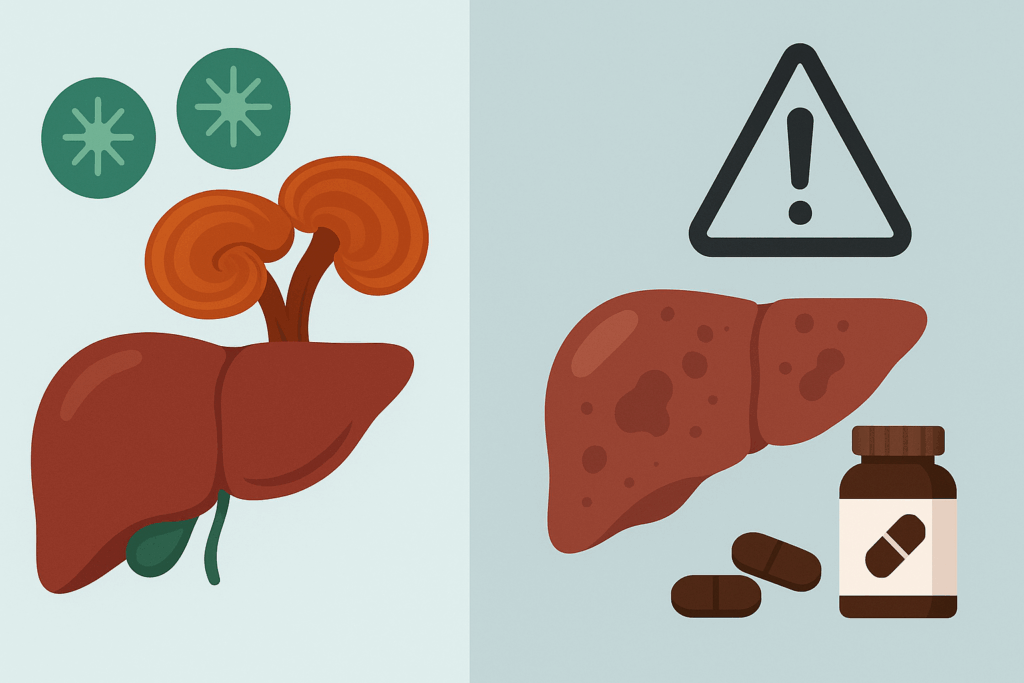
How to Use Reishi Mushroom Powder in Everyday Wellness Practices
Understanding how to use reishi mushroom powder in daily life extends beyond simple ingestion. Incorporating reishi into a morning smoothie can be an effortless way to begin the day with a calming boost. Some individuals prefer blending the powder into a warm latte with almond or oat milk, creating a soothing beverage that supports emotional balance. Culinary enthusiasts might also add reishi powder to soups or broths, subtly enhancing meals with adaptogenic benefits. Regardless of the method, regular integration into daily routines is key to experiencing reishi’s full potential. Choosing organic, high-quality reishi powder ensures that you reap maximum benefits without contaminants or fillers.
You may also like: Host Defense Reishi Mushroom Mycelium Powder Reviewed: A Leading Organic Product for Boosting Your Heart Health, Energy, and Stress Resilience
Is Reishi Mushroom Safe for Long-Term Use?
The question “is reishi mushroom safe” often arises among health-conscious individuals considering long-term supplementation. Research and historical use suggest that reishi is remarkably safe when consumed responsibly. Unlike some adaptogens that require cycling, reishi can generally be used continuously for extended periods without risk of dependency or tolerance. However, attention to dosage remains important. Individuals new to reishi are advised to start with lower doses and gradually increase to their ideal amount. Those with pre-existing health conditions or who are taking specific medications should consult healthcare professionals to ensure that incorporating reishi does not interfere with ongoing treatments or exacerbate medical issues.

What Does Reishi Mushroom Do for the Immune System?
Among the most celebrated reishi mushroom benefits is its profound effect on immune regulation. What does reishi mushroom do to enhance immune function? It operates by modulating immune responses rather than overstimulating them. This balancing act helps the body defend against pathogens while avoiding autoimmune overactivity. Polysaccharides and beta-glucans within reishi mushrooms activate key immune cells, such as natural killer (NK) cells and macrophages, crucial for detecting and neutralizing threats. Moreover, ganoderma lucidum mushroom extract has demonstrated significant antioxidant properties, further protecting immune cells from oxidative damage. These features make reishi an invaluable ally during cold and flu seasons or times of increased physical and emotional stress.
Exploring the “Mushroom of Immortality”: Myth or Reality?
The title “Mushroom of Immortality” given to reishi mushroom is not merely poetic but rooted in its perceived longevity-enhancing properties. While reishi will not grant literal immortality, its ability to support cardiovascular health, modulate inflammation, and enhance resilience against stressors contributes to improved longevity potential. Studies exploring “can reishi protect against diabetes” further enhance its reputation as a protector against chronic metabolic conditions. Although more research is needed to confirm these effects conclusively, early evidence suggests that reishi may indeed play a role in reducing risk factors associated with premature aging and chronic disease development.
Can You Eat Reishi Mushrooms Whole?
While powdered or extracted forms are preferred, many people wonder, “can you eat reishi mushrooms whole?” Technically, yes, but it is not recommended. Whole reishi mushrooms are extremely tough and woody, making them difficult to chew or digest. Their bitter taste and fibrous texture are best suited for decoction into teas or extraction into powders and tinctures. Consuming whole mushrooms offers no advantage over properly prepared supplements and may actually result in reduced bioavailability of active compounds. Thus, when considering the best way to take reishi mushroom, powders, extracts, or capsules are far more efficient and palatable options.

How to Use Reishi Mushroom Powder for Sleep Support
Another vital aspect of how to use reishi mushroom powder lies in its application for improving sleep quality. Many individuals struggling with insomnia or restlessness have found reishi to be a natural, non-sedating solution. Reishi’s calming properties, attributed to its triterpene content, promote relaxation and balance circadian rhythms without causing drowsiness during the day. For best results, incorporating reishi powder into an evening tea ritual or a calming bedtime smoothie can foster an environment conducive to restful sleep. Addressing the question “does reishi make you sleepy,” it is more accurate to say that reishi supports the body’s natural sleep cycles rather than inducing artificial sleepiness.
Recognizing and Managing Reishi Mushroom Allergy
Although rare, some individuals may experience a reishi mushroom allergy. Symptoms can include mild respiratory irritation, skin rashes, or digestive upset. When starting reishi supplementation, it is wise to monitor your body closely for any adverse reactions, particularly if you have a history of mushroom allergies. Choosing high-quality products, free from additives and contaminants, significantly reduces the risk of allergic responses. If symptoms persist or worsen, discontinuation and consultation with a healthcare provider are advised. Awareness of reishi mushroom allergy is essential for safe and enjoyable integration into your wellness journey.
How to Use Reishi Mushroom Powder to Boost Adaptogenic Support
Strategically using reishi powder alongside other adaptogens can amplify its benefits. Combining reishi with herbs like ashwagandha or rhodiola can create a synergistic effect, enhancing the body’s resilience to stress even further. Understanding how to use reishi mushroom powder in multi-adaptogen blends offers a sophisticated approach to holistic health. For instance, blending reishi powder into an adaptogenic smoothie containing maca, holy basil, and cacao can create a powerful, nourishing beverage that supports both mind and body. Experimenting with various combinations allows individuals to personalize their wellness routines to match their unique stress profiles and lifestyle needs.

Evaluating the Risks: Reishi Mushroom Liver Toxicity Concerns
Concerns about “reishi mushroom liver toxicity” sometimes emerge in discussions about long-term supplementation. These concerns typically stem from case reports involving high-dose or prolonged use of poor-quality extracts. High-quality, properly processed reishi products have not been conclusively linked to liver toxicity in healthy individuals. In fact, reishi’s antioxidant properties may offer protective effects for liver health when used appropriately. As with any supplement, responsible sourcing, appropriate dosing, and regular monitoring of health markers are key to ensuring safety. When in doubt, choosing reputable brands with third-party testing certifications can provide additional peace of mind.
Practical Advice: Choosing and Storing Red Reishi Mushroom Powder
Selecting the right red reishi mushroom powder is crucial for ensuring potency and safety. Look for products that specify “Ganoderma lucidum” on their labels and that offer full transparency regarding sourcing, extraction methods, and testing protocols. Organic certification and third-party lab testing are strong indicators of product quality. Storage practices also matter: reishi powder should be kept in a cool, dry place away from direct sunlight to preserve its potency. Using airtight containers can prevent moisture exposure, ensuring that the powder maintains its therapeutic properties over time.
What Is Reishi Mushroom Good For? A Holistic Perspective
Ultimately, reishi mushroom is good for far more than just stress relief. Its adaptogenic properties enhance resilience to both physical and emotional stressors. Its immunomodulatory effects support stronger defenses against infections and illnesses. Its antioxidant activity helps combat the damaging effects of free radicals, a key factor in aging and chronic disease development. Even emerging areas of research, such as reishi’s potential to protect against metabolic syndrome and diabetes, point to its broad-reaching health benefits. Integrating reishi into your daily wellness plan can thus offer multifaceted support for a vibrant, balanced life.
Frequently Asked Questions About Reishi Mushroom and Its Benefits
How to Use Reishi Mushroom Powder for Personalized Stress Relief
Personalizing how to use reishi mushroom powder can significantly improve its effectiveness. One emerging method is microdosing small amounts throughout the day rather than taking a single dose, helping maintain a consistent adaptogenic effect. Blending the powder into functional foods like chia pudding, overnight oats, or protein energy bites is gaining popularity for those seeking effortless integration. Another trend involves combining reishi powder with nootropic supplements to optimize both stress resilience and cognitive performance. With evolving techniques, reishi powder is becoming not just a supplement but a versatile tool for daily wellness customization.
What Is the Best Way to Take Reishi Mushroom for Maximum Absorption?
The best way to take reishi mushroom for maximum absorption involves pairing it with healthy fats such as coconut oil or avocado. These fats help facilitate the absorption of fat-soluble triterpenes, one of reishi’s most potent compounds. Preparing reishi with warm liquids, particularly tea or broth, also enhances bioavailability because the heat helps break down the mushroom’s tough cell walls. Timing matters as well; consuming reishi in the evening may better align with natural cortisol rhythms, improving relaxation. Individuals aiming to maximize the benefits of ganoderma lucidum mushroom extract should consider these small but powerful enhancements to their routine.
Can Reishi Protect Against Diabetes in Practical Daily Use?
While the question “can reishi protect against diabetes” remains under investigation, emerging research suggests that incorporating reishi consistently may support better metabolic health. Reishi appears to influence glucose metabolism by improving insulin sensitivity and reducing systemic inflammation, two critical factors in diabetes management. Consistent use of reishi powder alongside a balanced diet rich in fiber and phytonutrients may enhance its preventative effects. It is important to note that reishi is not a substitute for medical treatment, but it offers promising adjunctive support. Future clinical studies may further clarify how much reishi per day optimally supports metabolic wellness.
Can You Eat Reishi Mushrooms Directly for Health Benefits?
Many people ask, “can you eat reishi mushrooms directly,” and while it is technically possible, it is not advisable. Reishi mushrooms are extremely woody and bitter, making them almost inedible without extensive cooking. Even with boiling, only a fraction of the beneficial compounds are released, which is why ganoderma lucidum mushroom extract or powder is a much more efficient choice. In culinary traditions, reishi is typically simmered for hours to create medicinal broths or teas rather than consumed whole. Therefore, powders and extracts represent a more practical and bioavailable form for modern use.
How Much Reishi Mushroom Per Day Is Ideal for Stress and Sleep?
Determining how much reishi mushroom per day is ideal depends on individual goals and health status. For general stress resilience and mild sleep support, 1 to 1.5 grams of reishi powder daily is sufficient. Those seeking enhanced immune or metabolic benefits may increase intake under professional supervision. Dividing doses between morning and evening helps maintain steady adaptogenic support without overwhelming the system. For those exploring how to use reishi, monitoring subtle changes in mood, energy, and sleep over time will guide optimal dosage adjustments.
How to Use Reishi Mushroom Powder to Support Nighttime Relaxation
Learning how to use reishi mushroom powder for nighttime relaxation involves creating intentional evening rituals. Mixing the powder into warm golden milk lattes, incorporating adaptogens like ashwagandha, can ease the transition to restful sleep. Some users report benefits from combining reishi with magnesium glycinate, enhancing muscular relaxation and nervous system balance. Developing a “wind-down” tea ritual featuring red reishi mushroom powder can psychologically anchor relaxation habits. Addressing “does reishi make you sleepy,” it’s important to understand reishi promotes sleep indirectly by calming overactive stress responses, not by acting as a sedative.
Can You Take Too Many Mushroom Supplements Safely?
A common concern is whether you can take too many mushroom supplements. Although reishi and similar adaptogens are generally safe, excessive intake could burden the liver and digestive system over time. Listening to the body’s subtle feedback—like mild digestive upset or fatigue—can signal when to moderate dosage. Rotating different mushroom types seasonally, such as reishi, lion’s mane, and cordyceps, can help prevent overaccumulation of specific compounds. Monitoring liver markers annually if using concentrated forms like ganoderma lucidum mushroom extract is a wise precaution for long-term users. As with any supplement, more is not always better—precision and mindfulness are key.
Does Eastern Medicine Use Reishi Mushrooms Differently Than the West?
Exploring “does eastern medicine use reishi mushrooms differently” reveals fascinating contrasts. In Traditional Chinese Medicine (TCM), reishi—also known as ling chi mushroom—is often combined with other herbs in intricate formulations tailored to individual constitutions. The Western approach tends to isolate reishi mushroom benefits for stress or immunity without as much personalization. TCM emphasizes reishi’s role in spiritual elevation, calming the “shen” or spirit, which is often underappreciated in Western interpretations. Additionally, Eastern protocols often prescribe reishi alongside practices like acupuncture and meditation, enhancing its mind-body integrative effects. This holistic perspective offers valuable insights for those seeking deeper applications.
How Does Red Reishi Tea Compare to Other Mushroom Beverages?
Evaluating red reishi tea benefits reveals why it stands apart from other mushroom beverages. Unlike lion’s mane or cordyceps teas, which focus heavily on cognitive or energy-boosting effects, red reishi tea emphasizes grounding and deep relaxation. Its polysaccharide content not only nourishes the immune system but also stabilizes blood sugar levels subtly over time. When brewed slowly over several hours, red reishi tea maximizes the extraction of key compounds like triterpenes. For those wondering what is reishi mushroom good for beyond stress relief, red reishi tea provides a comprehensive, nourishing elixir supporting longevity and systemic balance.
What Does Reishi Mushroom Do for Long-Term Vitality and Wellness?
Delving into “what does reishi mushroom do” reveals its cumulative power over long-term use. Reishi’s anti-inflammatory and antioxidant properties help buffer the body against the wear and tear of chronic stress, supporting cardiovascular, neurological, and metabolic health. This “slow medicine” approach fits the reishi ethos—benefits build subtly over months or even years of consistent use. Emerging evidence also hints at reishi’s role in promoting healthy gut microbiota, a key player in immune and emotional resilience. Whether consumed as a reishi mushroom capsule, powder, or decoction, the mushroom of immortality continues to validate its legendary reputation through modern scientific inquiry.
Conclusion: Embracing the Transformative Power of Reishi Mushroom
Exploring how to use reishi mushroom powder reveals a world of natural, transformative possibilities for stress relief, immune support, and overall wellness. As we navigate the challenges of modern life, tools like reishi offer a time-honored, scientifically backed means to fortify our minds and bodies. From the soothing ritual of red reishi tea to the practical convenience of capsules, the versatility of reishi ensures accessibility for every lifestyle. Remember, mindful sourcing, responsible dosing, and consistent use are key to unlocking the full potential of this “Mushroom of Immortality.” Whether you are seeking to calm your nerves, bolster your immune system, or simply enrich your daily health routine, reishi mushroom powder stands ready to support your journey toward greater resilience and vitality.
Further Reading:
Everything you need to know about reishi mushrooms
6 Benefits of Reishi Mushroom (Plus Side Effects and Dosage)
